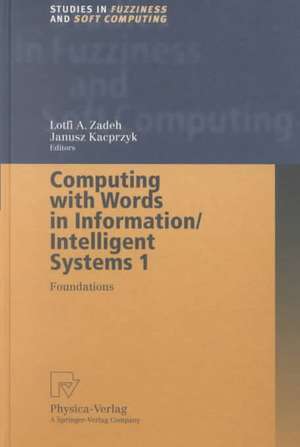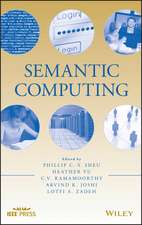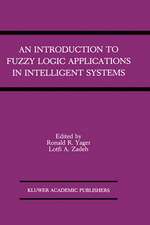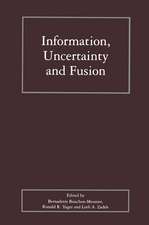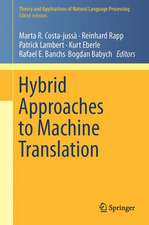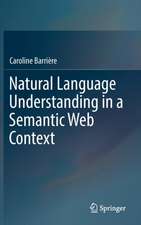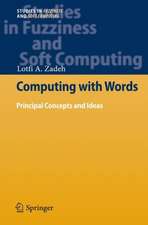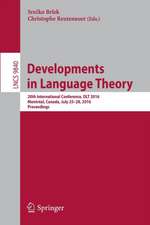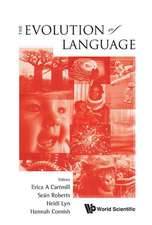Computing with Words in Information/Intelligent Systems 1: Foundations: Studies in Fuzziness and Soft Computing, cartea 33
Editat de Lotfi A. Zadehen Limba Engleză Hardback – 16 iul 1999
| Toate formatele și edițiile | Preț | Express |
|---|---|---|
| Paperback (1) | 998.87 lei 43-57 zile | |
| Physica-Verlag HD – 13 iul 2013 | 998.87 lei 43-57 zile | |
| Hardback (1) | 1005.31 lei 43-57 zile | |
| Physica-Verlag HD – 16 iul 1999 | 1005.31 lei 43-57 zile |
Din seria Studies in Fuzziness and Soft Computing
- 20%
 Preț: 999.85 lei
Preț: 999.85 lei - 20%
 Preț: 653.06 lei
Preț: 653.06 lei - 20%
 Preț: 872.98 lei
Preț: 872.98 lei - 20%
 Preț: 930.57 lei
Preț: 930.57 lei - 20%
 Preț: 1051.00 lei
Preț: 1051.00 lei - 20%
 Preț: 992.44 lei
Preț: 992.44 lei - 20%
 Preț: 655.85 lei
Preț: 655.85 lei - 20%
 Preț: 1001.86 lei
Preț: 1001.86 lei - 18%
 Preț: 954.14 lei
Preț: 954.14 lei - 20%
 Preț: 330.10 lei
Preț: 330.10 lei - 20%
 Preț: 333.04 lei
Preț: 333.04 lei - 20%
 Preț: 997.56 lei
Preț: 997.56 lei -
 Preț: 391.61 lei
Preț: 391.61 lei - 20%
 Preț: 647.79 lei
Preț: 647.79 lei - 20%
 Preț: 986.01 lei
Preț: 986.01 lei - 18%
 Preț: 958.56 lei
Preț: 958.56 lei - 20%
 Preț: 996.40 lei
Preț: 996.40 lei - 20%
 Preț: 999.35 lei
Preț: 999.35 lei - 15%
 Preț: 646.43 lei
Preț: 646.43 lei - 20%
 Preț: 651.57 lei
Preț: 651.57 lei - 20%
 Preț: 997.89 lei
Preț: 997.89 lei - 15%
 Preț: 641.03 lei
Preț: 641.03 lei - 20%
 Preț: 1009.74 lei
Preț: 1009.74 lei - 20%
 Preț: 992.62 lei
Preț: 992.62 lei -
 Preț: 388.72 lei
Preț: 388.72 lei - 18%
 Preț: 1223.43 lei
Preț: 1223.43 lei - 20%
 Preț: 651.42 lei
Preț: 651.42 lei - 18%
 Preț: 951.59 lei
Preț: 951.59 lei - 18%
 Preț: 948.61 lei
Preț: 948.61 lei
Preț: 1005.31 lei
Preț vechi: 1256.64 lei
-20% Nou
Puncte Express: 1508
Preț estimativ în valută:
192.43€ • 209.09$ • 161.74£
192.43€ • 209.09$ • 161.74£
Carte tipărită la comandă
Livrare economică 21 aprilie-05 mai
Preluare comenzi: 021 569.72.76
Specificații
ISBN-13: 9783790812176
ISBN-10: 379081217X
Pagini: 532
Ilustrații: XIII, 518 p.
Dimensiuni: 156 x 234 x 34 mm
Greutate: 0.92 kg
Ediția:1999
Editura: Physica-Verlag HD
Colecția Physica
Seria Studies in Fuzziness and Soft Computing
Locul publicării:Heidelberg, Germany
ISBN-10: 379081217X
Pagini: 532
Ilustrații: XIII, 518 p.
Dimensiuni: 156 x 234 x 34 mm
Greutate: 0.92 kg
Ediția:1999
Editura: Physica-Verlag HD
Colecția Physica
Seria Studies in Fuzziness and Soft Computing
Locul publicării:Heidelberg, Germany
Public țintă
ResearchCuprins
Fuzzy Logic = Computing with Words.- Performing Approximate Reasoning with Words?.- Approximate Reasoning as a Basis for Computing with Words.- What is Intelligent Measurement?.- Semiotics and Computational Linguistics. On Semiotic Cognitive Information Processing.- Words about Uncertainty: Analogies and Contexts.- Virtual Meaning: Problems of Interpretation in the Social Sciences.- Towards Fixing Some ‘Fuzzy’ Catchwords: A Terminological Primer.- Granular Computing: Fuzzy Logic and Rough Sets.- Towards an Adaptive Calculus of Granules.- Semantics and Modelling of Flexible Time Indications.- Towards Fuzzy Logic.- Fuzzy Negation.- Triangular Operations, Negations, and Scalar Cardinality of a Fuzzy Set.- Fuzzy Implications in Approximate Reasoning.- On the Semantics of Fuzzy Linguistic Quantifiers.- Evaluating Linguistic Expressions and Functional Fuzzy Theories in Fuzzy Logic.- Calculation over Verbal Quantities.- Aggregation of Linguistic Information Based on a Symbolic Approach.- Object Networks: A Computational Framework to Compute with Words.- Study on a Framework for Solving Ill-defined Problems Using Patterns and Symbols.- From Expert Words Directly to Numerical Simulations: Group-Theoretic Approach to Computing with Words in Information/Intelligent Systems.
Textul de pe ultima copertă
The volume is the first one in the world literature which is a comprehensive, up to date account on computing with words, a new direction in broadly perceived intelligent systems, proposed and advocated by Professor Zadeh, the founder of fuzzy sets theory and fuzzy logic. Historically, computing was focused on manipulation of numbers. However, in recent years it became more and more obvious that computing had been encompassing not only this, but also manipulation on signal, sounds, images and text; the latter aspects of computing are becoming more and more relevant. However, the traditional manipulation of text (e.g., machine translation, spell checking, etc.) does not cover the mainstream of computing with words, mainly the representation and manipulation of propositions from natural language describing operations and relations. Such problems cannot be solved by conventional methods of logic, probability theory and numerical analysis. Fuzzy logic is shown to be an effective tool to handle such problems.
Computing with words may form a basis of a computational theory of perceptions inspired by a remarkable human ability to perform a wide variety of tasks just on the basis of vague and imprecise information expressed in natural language.
In Part 1 foundations of computing with words related to linguistic aspects, fuzzy logic and approximate reasoning, granularity, calculations on verbal quantities, and general architectures for the implementation of computing with words are presented.
Computing with words may form a basis of a computational theory of perceptions inspired by a remarkable human ability to perform a wide variety of tasks just on the basis of vague and imprecise information expressed in natural language.
In Part 1 foundations of computing with words related to linguistic aspects, fuzzy logic and approximate reasoning, granularity, calculations on verbal quantities, and general architectures for the implementation of computing with words are presented.
Caracteristici
These two volumes, "Foundations" and "Applications" provide the current statuts of theoretical and empirical developments in "computing with words"
